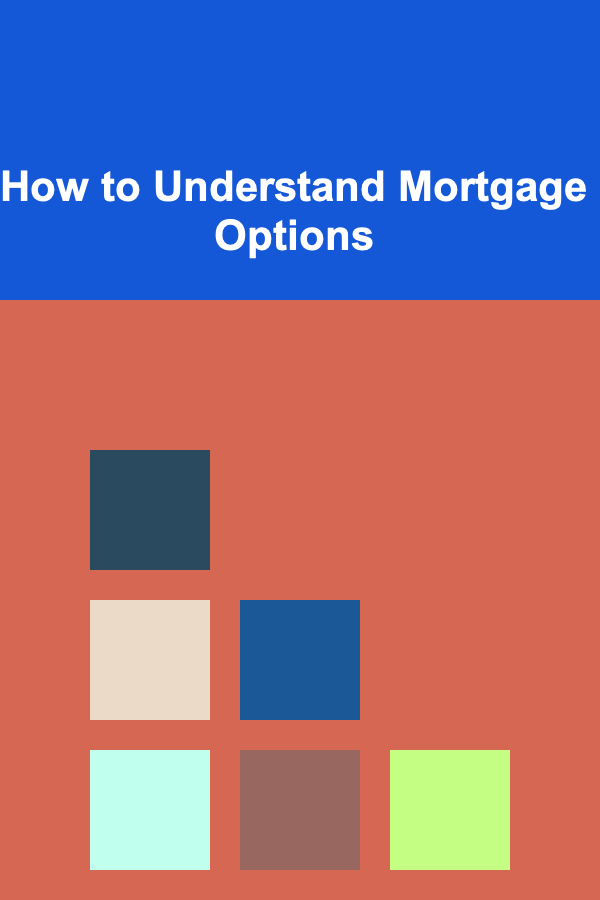
How to Understand Mortgage Options
ebook include PDF & Audio bundle (Micro Guide)
$12.99$6.99
Limited Time Offer! Order within the next:

A mortgage is a loan specifically for purchasing a home or other real estate, and understanding the various mortgage options available is crucial for any homebuyer. Selecting the right mortgage can have a significant impact on your financial future, so it's essential to weigh your options carefully. This article explores the different types of mortgages, their features, and key factors to consider when choosing the right mortgage for your needs.
What Is a Mortgage?
A mortgage is a loan used to buy real estate, typically a home, where the property itself serves as collateral for the loan. Mortgages usually have long repayment periods, ranging from 15 to 30 years, and are paid back in monthly installments. The monthly payment includes both principal (the amount borrowed) and interest (the cost of borrowing). The terms of a mortgage can vary widely depending on the type of loan, the lender, and the borrower's financial situation.
There are several types of mortgages, each with unique features and advantages. Understanding the various mortgage options will help you make an informed decision and find the best mortgage for your circumstances.
Types of Mortgage Loans
1. Fixed-Rate Mortgages
A fixed-rate mortgage is one of the most common types of mortgages. With a fixed-rate mortgage, the interest rate remains the same for the entire term of the loan, making your monthly payments predictable. The advantage of this type of mortgage is stability. You'll always know what your monthly payment will be, which makes budgeting easier.
Advantages of Fixed-Rate Mortgages:
- Predictable Payments: Your monthly payments will not change throughout the life of the loan.
- Protection Against Interest Rate Increases: If interest rates rise in the future, your rate will remain the same.
- Long-Term Stability: Fixed-rate mortgages are ideal for long-term homeowners who plan to stay in the property for several years.
Disadvantages of Fixed-Rate Mortgages:
- Higher Initial Interest Rates: Fixed-rate mortgages often have higher interest rates than adjustable-rate mortgages (ARMs), especially in the early years.
- Less Flexibility: If interest rates drop significantly, you'll still be stuck with your fixed rate unless you refinance, which could involve additional costs and time.
2. Adjustable-Rate Mortgages (ARMs)
An adjustable-rate mortgage (ARM) has an interest rate that can change periodically, depending on the performance of a specific benchmark, such as the LIBOR (London Interbank Offered Rate) or the U.S. Treasury rate. Initially, an ARM often offers a lower interest rate than a fixed-rate mortgage, which can make it an attractive option for borrowers who expect to move or refinance before the rate adjusts.
Advantages of ARMs:
- Lower Initial Rates: The initial rate on an ARM is typically lower than that of a fixed-rate mortgage, which can result in lower initial monthly payments.
- Potential for Lower Payments: If interest rates decline or remain low, your mortgage payments may decrease after the adjustment period.
Disadvantages of ARMs:
- Rate Increases: After the initial period, the interest rate can increase, leading to higher monthly payments. This unpredictability can be challenging for homeowners who are on a fixed budget.
- Complexity: ARMs are more complex than fixed-rate mortgages because the interest rate can change based on market conditions, making it more difficult to predict your future payments.
3. Interest-Only Mortgages
With an interest-only mortgage, the borrower initially only pays the interest on the loan, not the principal, for a set period, typically 5-10 years. After the interest-only period ends, the borrower begins to pay both principal and interest, often resulting in a higher monthly payment.
Advantages of Interest-Only Mortgages:
- Lower Initial Payments: During the interest-only period, your monthly payments are lower because you're only paying the interest.
- Flexibility: If you plan to sell the home or refinance within a few years, an interest-only mortgage could make sense, as you'll pay lower initial payments.
Disadvantages of Interest-Only Mortgages:
- No Equity Building: Since you're only paying the interest, you're not building any equity in the property during the interest-only period.
- Higher Payments Later: After the interest-only period ends, your monthly payments can increase significantly because you'll need to start paying off the principal in addition to the interest.
4. FHA Loans
Federal Housing Administration (FHA) loans are government-backed loans designed to help first-time homebuyers and borrowers with less-than-perfect credit. FHA loans generally require a lower down payment, making them more accessible for individuals who may not have enough savings for a traditional down payment.
Advantages of FHA Loans:
- Lower Down Payments: FHA loans typically require a down payment as low as 3.5%, making homeownership more accessible.
- More Lenient Credit Requirements: FHA loans are often easier to qualify for, especially for first-time homebuyers or those with a history of credit challenges.
Disadvantages of FHA Loans:
- Mortgage Insurance: FHA loans require both an upfront mortgage insurance premium and ongoing monthly mortgage insurance, which adds to the overall cost of the loan.
- Loan Limits: FHA loans have limits on how much you can borrow, which can be a disadvantage in areas with higher property values.
5. VA Loans
Veterans Affairs (VA) loans are available to active-duty service members, veterans, and their families. VA loans are issued by approved lenders but are backed by the U.S. Department of Veterans Affairs, which makes it easier for veterans to secure financing.
Advantages of VA Loans:
- No Down Payment: VA loans often don't require a down payment, making them an attractive option for veterans with limited savings.
- No Private Mortgage Insurance (PMI): Unlike many other low-down-payment loans, VA loans do not require PMI, which can result in lower monthly payments.
- Competitive Interest Rates: VA loans often offer competitive interest rates compared to other types of loans.
Disadvantages of VA Loans:
- Eligibility Requirements: Not all service members or veterans qualify for VA loans. Eligibility depends on factors such as length of service and discharge status.
- Funding Fee: While VA loans don't require PMI, they do require a funding fee, which can increase the overall cost of the loan.
6. USDA Loans
The U.S. Department of Agriculture (USDA) offers loans for low- and moderate-income buyers in rural areas. These loans are designed to encourage development in rural communities and typically do not require a down payment.
Advantages of USDA Loans:
- No Down Payment: USDA loans offer the benefit of 100% financing, meaning you don't need to make a down payment.
- Lower Mortgage Insurance: USDA loans typically have lower mortgage insurance costs compared to FHA loans.
Disadvantages of USDA Loans:
- Geographical Restrictions: USDA loans are only available for properties in designated rural areas, which may not be suitable for borrowers looking to live in urban or suburban locations.
- Income Limits: USDA loans have income restrictions, so they are not available to all borrowers.
7. Jumbo Loans
A jumbo loan is a type of mortgage that exceeds the conforming loan limits set by the Federal Housing Finance Agency (FHFA). These loans are typically used for luxury homes or properties in high-cost areas.
Advantages of Jumbo Loans:
- High Loan Limits: Jumbo loans can help you finance more expensive properties that exceed the limits of conventional loans.
- Flexible Terms: Jumbo loans may offer flexible repayment terms, allowing you to tailor the loan to your financial situation.
Disadvantages of Jumbo Loans:
- Stricter Qualification Requirements: Jumbo loans typically have stricter credit requirements and may require a larger down payment.
- Higher Interest Rates: Since jumbo loans are considered higher risk by lenders, they often come with higher interest rates than conforming loans.
Key Factors to Consider When Choosing a Mortgage
When deciding which mortgage option is right for you, there are several key factors to consider:
1. Interest Rate
The interest rate determines the cost of borrowing money and will have a significant impact on your monthly payments. Be sure to compare the rates offered by different lenders and consider whether a fixed or adjustable-rate mortgage is more suitable for your situation.
2. Loan Term
The term of your loan determines how long you'll be making payments. A longer-term loan (e.g., 30 years) typically results in lower monthly payments but may cost more in interest over the life of the loan. A shorter-term loan (e.g., 15 years) usually has higher monthly payments but can save you money on interest in the long run.
3. Down Payment
The amount you can afford to put down on the home will affect the type of loan you can qualify for. A larger down payment can result in a lower interest rate and eliminate the need for mortgage insurance, while a smaller down payment may require additional costs or insurance.
4. Monthly Payment
Consider how much you can afford to pay each month. Your monthly mortgage payment should be manageable based on your income, other debts, and living expenses.
5. Closing Costs
In addition to the down payment, you'll need to budget for closing costs, which can include fees for the loan application, appraisal, title insurance, and more. These costs can vary depending on the type of loan and lender.
6. Eligibility
Different mortgage types have different eligibility requirements. For example, FHA loans are designed for first-time homebuyers, while VA loans are available to veterans and active-duty military members. Make sure you meet the eligibility criteria before applying for a specific loan.
Conclusion
Choosing the right mortgage is an essential step in the homebuying process. Understanding the various types of mortgages, their advantages and disadvantages, and the factors that will impact your decision can help you make an informed choice. Take the time to compare mortgage options, consider your long-term financial goals, and consult with a financial advisor to ensure that you select the best mortgage for your situation.

How to Clean Your Home Using Natural and Eco-Friendly Products
Read More
How to Create a Baby or Nursery Inventory
Read More
How to Set Up a Checklist for Practicing Gratitude and Positivity
Read More
How To Stay Ahead of the Next Big Fashion Trend
Read More
How to Navigate Political Differences in Dating
Read More
How to Deal with Criticism from Your Partner
Read MoreOther Products

How to Clean Your Home Using Natural and Eco-Friendly Products
Read More
How to Create a Baby or Nursery Inventory
Read More
How to Set Up a Checklist for Practicing Gratitude and Positivity
Read More
How To Stay Ahead of the Next Big Fashion Trend
Read More
How to Navigate Political Differences in Dating
Read More